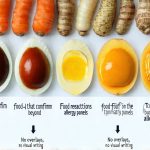Food sensitivities are increasingly common, impacting millions worldwide with symptoms ranging from mild discomfort to debilitating chronic conditions. Many individuals struggle to pinpoint exactly why they feel unwell after eating certain foods, often experiencing a frustrating disconnect between what they eat and how they feel. Traditional allergy testing frequently comes back negative, leaving people feeling dismissed or unsure where to turn for answers. This has led to growing interest in the idea that food sensitivities aren’t necessarily about immediate immune reactions like classic allergies, but rather a more complex interplay between the gut, the immune system, and inflammation – potentially positioning cause inflammation as a central driving force behind these adverse reactions.
The conventional understanding of food allergy focuses on IgE-mediated hypersensitivity, where the body identifies a food protein as an intruder and mounts a rapid, often dramatic, immune response. Food intolerances, on the other hand, are typically linked to enzyme deficiencies or pharmacological effects (like histamine in aged cheese). However, food sensitivities seem to fall somewhere between these two categories, involving a more subtle – but potentially chronic – immune activation that doesn’t necessarily trigger an immediate allergic reaction. This is where inflammation enters the picture, suggesting it might be the common denominator linking seemingly disparate food-related symptoms and individual triggers. The rising prevalence of both gut dysbiosis (an imbalance in gut bacteria) and chronic low-grade inflammation further supports this hypothesis. Understanding gut health is crucial to addressing these issues.
Understanding Inflammation’s Role
Inflammation isn’t inherently bad; it’s a vital part of our body’s defense system, designed to protect us from injury and infection. It’s the process by which our immune cells recognize and respond to threats, triggering a cascade of events that leads to redness, swelling, heat, and pain – all aimed at restoring health. However, when inflammation becomes chronic and persistent, it can wreak havoc on the body, contributing to a wide range of health problems. This chronic state is often linked to lifestyle factors like poor diet, stress, lack of sleep, and environmental toxins. In the context of food sensitivities, the idea is that certain foods, even if not causing an immediate allergic reaction, can trigger or exacerbate this underlying inflammation.
The gut plays a crucial role in regulating inflammation. A healthy gut barrier acts as a selective filter, allowing nutrients to be absorbed while keeping harmful substances (like undigested food particles and bacteria) contained within the digestive tract. When this barrier becomes compromised – often referred to as “leaky gut” or increased intestinal permeability – these substances can leak into the bloodstream, triggering an immune response and systemic inflammation. This is where food sensitivities can become problematic; even foods that are generally well-tolerated might contribute to this process if the gut barrier is weakened. Understanding gut microbiome function is key here.
It’s important to note that the relationship between food sensitivities and inflammation isn’t always straightforward. It’s often a bidirectional one: food sensitivities can contribute to inflammation, but existing inflammation can also increase susceptibility to food sensitivities. For example, someone with an autoimmune condition already experiencing systemic inflammation might be more likely to react to certain foods than someone with a healthy gut and immune system. This complexity makes identifying the root cause of food-related symptoms challenging, requiring a holistic approach that considers both dietary factors and overall health status. Stress on sensitivities can also play a significant role in exacerbating these issues.
The Gut Microbiome Connection
The composition of our gut microbiome – the trillions of bacteria, fungi, viruses, and other microorganisms living in our digestive tract – has a profound impact on inflammation and immune function. A diverse and balanced microbiome supports a strong gut barrier, helps regulate immune responses, and produces beneficial compounds that reduce inflammation. Conversely, an imbalanced microbiome (dysbiosis) can contribute to increased intestinal permeability, chronic inflammation, and heightened sensitivity to food triggers.
- Dysbiosis can be caused by factors like antibiotic use, poor diet (high in processed foods and sugar), stress, and environmental toxins.
- Specific bacterial imbalances have been linked to increased reactivity to certain foods. For example, an overgrowth of certain bacteria might lead to increased production of histamine, exacerbating symptoms in individuals sensitive to histamine-rich foods.
- Restoring gut microbiome balance through dietary changes (like increasing fiber intake), probiotic supplementation (with caution and under professional guidance), and stress management techniques can be a key strategy for managing food sensitivities. Consider the benefits of probiotics as part of this approach.
Histamine Intolerance & Inflammation
Histamine is a naturally occurring chemical involved in many bodily functions, including immune response, digestion, and neurotransmission. While it’s essential for health, an imbalance between histamine production and breakdown can lead to histamine intolerance, characterized by a wide range of symptoms resembling food sensitivities. This isn’t a true allergy but rather a functional problem with histamine metabolism.
Many foods contain histamine or trigger its release in the body. Individuals with histamine intolerance may react to these foods, experiencing symptoms like headaches, hives, digestive issues, and fatigue. The underlying issue is often related to deficiencies in enzymes responsible for breaking down histamine, such as diamine oxidase (DAO). Chronic inflammation can further impair DAO activity, creating a vicious cycle where increased histamine levels contribute to more inflammation. Food or additive identification is key in these cases.
Mast Cell Activation Syndrome & Food Sensitivities
Mast cells are immune cells that play a central role in allergic reactions and inflammatory responses. In Mast Cell Activation Syndrome (MCAS), these cells become overly reactive, releasing excessive amounts of histamine and other inflammatory mediators even in the absence of a traditional allergen or trigger. While MCAS is a more complex condition requiring medical diagnosis, it provides another potential link between inflammation and food sensitivities.
- Foods can directly activate mast cells in susceptible individuals, leading to symptoms that mimic allergic reactions or food intolerances.
- Inflammation itself can contribute to mast cell instability, making them more likely to release inflammatory mediators.
- Identifying and eliminating trigger foods (often through an elimination diet under professional guidance) is a key component of managing MCAS and reducing symptom burden. It’s important to remember that MCAS requires proper diagnosis and treatment from a healthcare professional; self-treating can be dangerous.
Ultimately, understanding the intricate relationship between inflammation, the gut microbiome, histamine levels, mast cell activity, and food sensitivities is crucial for developing effective strategies to manage these conditions. While there’s no one-size-fits-all solution, adopting a holistic approach that prioritizes gut health, reduces overall inflammation, and identifies individual triggers can significantly improve quality of life for those struggling with food-related symptoms. It’s essential to work with qualified healthcare professionals – including doctors, registered dietitians, and functional medicine practitioners – to develop a personalized plan tailored to your specific needs and circumstances. Food restrictions can be emotionally challenging, so professional support is vital.


















